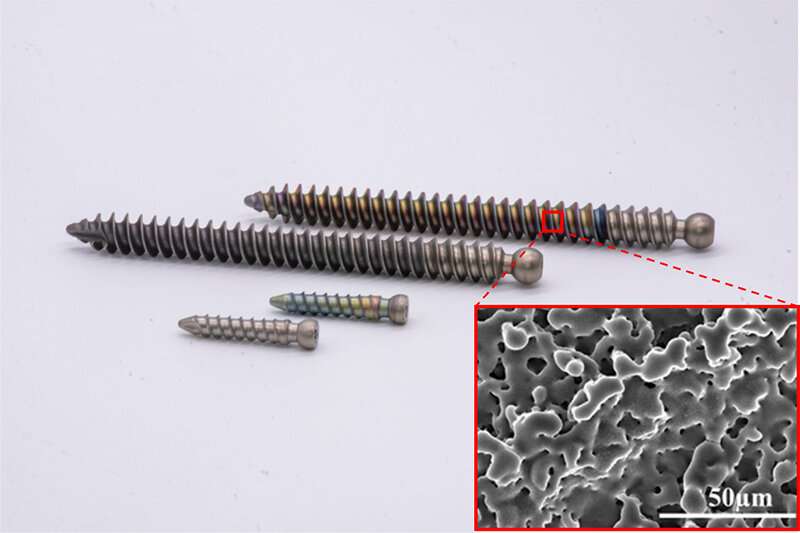New laser surface modification process with silver provides antimicrobial defense to titanium orthopedic devices

A patent-pending process developed by Purdue University engineers could improve the quality of life for the more than 6 million people who undergo orthopedic and trauma surgery annually, according to a paper published in Langmuir.
Infection is a major complication when rods, plates, screws and other devices are embedded into people during procedures like joint replacement surgery and spinal fusion surgery. Most infections occur because the devices' titanium implant surfaces have poor antibacterial and osteoinductive properties; osteoinduction is the process that prompts bone formation.
Rahim Rahimi, a Purdue University assistant professor in the School of Materials Engineering, has created a process that immobilizes silver onto the implant surfaces of titanium orthopedic devices to improve antibacterial properties and cellular integration. The process can be implemented onto many currently utilized metal implant surfaces.
The antibacterial efficacy of laser-nanotextured titanium surfaces with laser-immobilized silver was tested against both gram-positive (Staphylococcus aureus) and gram-negative (Escherichia coli) bacteria. The surfaces were observed to have efficient and stable antimicrobial properties for more than six days. The laser-nanotextured titanium surfaces also provided a 2.5-fold increase in osseointegration properties as compared to the pristine titanium implant surface.
"The first step of the two-step process creates a hierarchical nanostructure onto the titanium implant surface to enhance the bone cells' attachment," Rahimi said. "The second step immobilizes silver with antibacterial properties onto the titanium implant surface.
"The technology allows us to not only immobilize antibacterial silver compounds onto the surface of the titanium implants but also provide a unique surface nanotexturing that allows better settle attachment mineralization.
"These unique characteristics will allow improving implant outcomes, including less risk of infection and fewer complications like device failure."
Rahimi said the traditional method to address infections caused by implanted orthopedic devices often utilizes antibiotics or other surface modifications that have their own associated complications.
"Long-term antibacterial protection is not possible with these traditional drug coatings because a large portion of the loaded drug is released in a short time," Rahimi said. "There also is often a mixture of microbes that are found in implant-associated infection; it is essential to choose a bactericidal agent that covers a broad spectrum."
More information: Vidhya Selvamani et al, Laser-Assisted Nanotexturing and Silver Immobilization on Titanium Implant Surfaces to Enhance Bone Cell Mineralization and Antimicrobial Properties, Langmuir (2022). DOI: 10.1021/acs.langmuir.2c00008





















